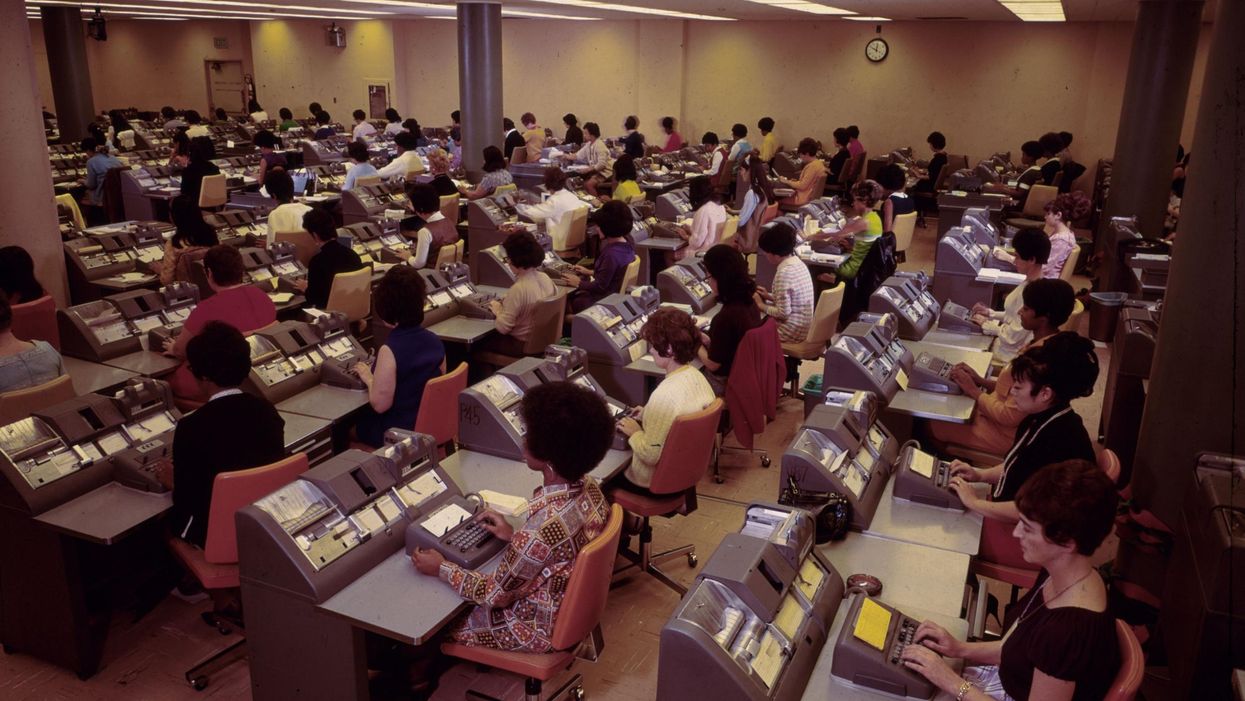News
Harriet Marsden
Nov 29, 2016

Picture:
Getty Images / Hulton Archive
A standard 9-5 office job can be very detrimental to your health.
Sitting behind a desk without regular movement, staring at screens, canteen eating and caffeine slumps can all contribute to an unhealthy physical lifestyle.
Meanwhile, disruption to natural circadian rhythms and sunlight deprivation negatively affect mental and emotional wellbeing.
In the 'gig economy', zero-hours contracts, the lack of contractual stability, poor economic opportunity and constant availability out of hours due to smartphones can send stress levels skyrocketing.
According to a 2013 Gallup survey of 142 countries, it is estimated that only 13 per cent of employees feel engaged at work.
But what's the solution? What really makes us happy at work?
- Obvious answers: massive paycheck, unlimited holidays and a ball pool in the office.
- Actual answers: much less superficial.
Back in 2014, the New York Times partnered with the Harvard Business Review and their company The Energy Project to survey more than 20,000 employees in total: mostly white-collar employees across a range of industries.
Based on their results, they surmised that there are actually four "core needs": simple components of a happy working lifestyle.
Theoretically, all these elements should be achievable in any job or sector.
1. Renewal
Taking a break every 90 minutes was found to increase focus levels by 30 per cent, compared to those who took no breaks or just one during the day.
This also increased creative thinking capacity by nearly 50 per cent, and a 46 per cent higher level of health.
Most significantly, employees who were encouraged by their supervisor to take breaks increased the likelihood of them staying in that company by almost 100 per cent.
A 2015 study researchers at Baylor University found that an average of two breaks per person per day benefits both managers and employees.
According to their data, the best time to take a workday break is mid -morning, and the most effective break incorporates a non-work-related activity that you enjoy.
Short, frequent breaks were more beneficial than longer breaks, but all were beneficial to health, eyesight and job satisfaction.
2. Focus
Leading on from renewal, focus was found to be poor in respondents (only 20 per cent reported that they could focus on one task at a time).
Only a third of participants in the survey felt they could prioritise their tasks.
However, those who could prioritise claimed that their ability to focus was significantly increased.
Prioritising tasks one by one helps focus your mind and increase productivity.
Health.com recommends several techniques for combating limited attention span, restlessness and distractibility which you can apply at work.
According to their information tackling important, difficult tasks first and working your way down to the easy job, is key to combating limited attention span.
They also recommend only checking emails at specific times, breaking down tasks into bite-size chunks, and argued that working in the same neat, uncluttered space every day helps limit distractions.
3. Value
Unsurprisingly, feeling cared for by your employer or supervisor has the most significant impact on people's job satisfaction.
Employees who described their supervisors as supportive were 1.3 times as likely to stay with their company, and almost 70 per cent more engaged with their work.
A 2012 study by the American Psychological Association found that half of all employees who did not feel valued at work, intended to look for a new job in the next year.
Meanwhile, employees who felt valued reported better physical and mental health, as well as higher levels of engagement and motivation.
93 per cent of employees said that feeling valued motivated them to do their best at work.
4. Purpose
Those employees that considered their work meaningful or significant in some way were more than three times as likely to stay with their company.
They also reported nearly twice as much job satisfaction and were 1.4 times more engaged at work.
In the entire survey, this was the variable with the greatest influence.
Michael F. Steger's 2012 paper directly associated 'meaningful' work with job satisfaction, productivity and overall happiness.
He cited meaningful work as a better predictor of absenteeism than job satisfaction and salary.
More: Europe's highest court has ruled that time taken to travel to work should count as work
More: The European countries who will have to work the most years
Top 100
The Conversation (0)













